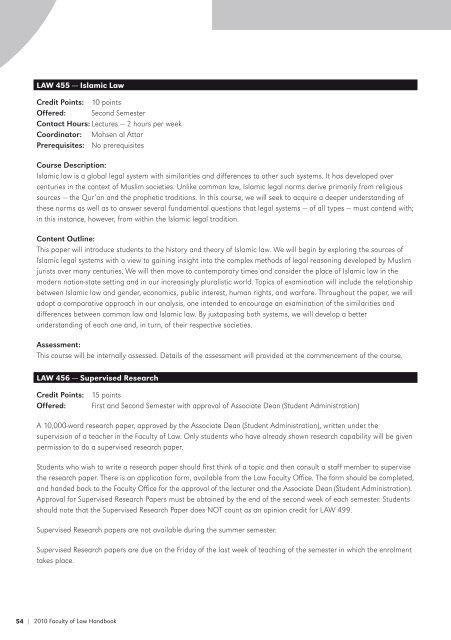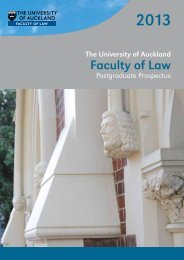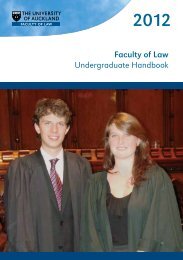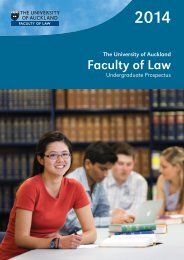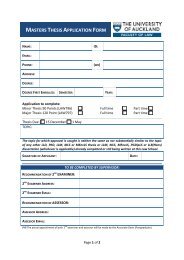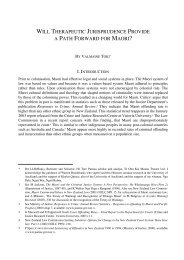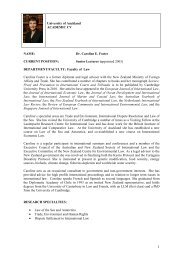Faculty of Law Undergraduate Handbook - Faculty of Law - The ...
Faculty of Law Undergraduate Handbook - Faculty of Law - The ...
Faculty of Law Undergraduate Handbook - Faculty of Law - The ...
- No tags were found...
Create successful ePaper yourself
Turn your PDF publications into a flip-book with our unique Google optimized e-Paper software.
LAW 455 — Islamic <strong>Law</strong>Credit Points: 10 pointsOffered: Second SemesterContact Hours: Lectures — 2 hours per weekCoordinator: Mohsen al AttarPrerequisites: No prerequisitesCourse Description:Islamic law is a global legal system with similarities and differences to other such systems. It has developed overcenturies in the context <strong>of</strong> Muslim societies. Unlike common law, Islamic legal norms derive primarily from religioussources — the Qur’an and the prophetic traditions. In this course, we will seek to acquire a deeper understanding <strong>of</strong>these norms as well as to answer several fundamental questions that legal systems — <strong>of</strong> all types — must contend with;in this instance, however, from within the Islamic legal tradition.Content Outline:This paper will introduce students to the history and theory <strong>of</strong> Islamic law. We will begin by exploring the sources <strong>of</strong>Islamic legal systems with a view to gaining insight into the complex methods <strong>of</strong> legal reasoning developed by Muslimjurists over many centuries. We will then move to contemporary times and consider the place <strong>of</strong> Islamic law in themodern nation-state setting and in our increasingly pluralistic world. Topics <strong>of</strong> examination will include the relationshipbetween Islamic law and gender, economics, public interest, human rights, and warfare. Throughout the paper, we willadopt a comparative approach in our analysis, one intended to encourage an examination <strong>of</strong> the similarities anddifferences between common law and Islamic law. By juxtaposing both systems, we will develop a betterunderstanding <strong>of</strong> each one and, in turn, <strong>of</strong> their respective societies.Assessment:This course will be internally assessed. Details <strong>of</strong> the assessment will provided at the commencement <strong>of</strong> the course.LAW 456 — Supervised ResearchCredit Points: 15 pointsOffered: First and Second Semester with approval <strong>of</strong> Associate Dean (Student Administration)A 10,000-word research paper, approved by the Associate Dean (Student Administration), written under thesupervision <strong>of</strong> a teacher in the <strong>Faculty</strong> <strong>of</strong> <strong>Law</strong>. Only students who have already shown research capability will be givenpermission to do a supervised research paper.Students who wish to write a research paper should first think <strong>of</strong> a topic and then consult a staff member to supervisethe research paper. <strong>The</strong>re is an application form, available from the <strong>Law</strong> <strong>Faculty</strong> Office. <strong>The</strong> form should be completed,and handed back to the <strong>Faculty</strong> Office for the approval <strong>of</strong> the lecturer and the Associate Dean (Student Administration).Approval for Supervised Research Papers must be obtained by the end <strong>of</strong> the second week <strong>of</strong> each semester. Studentsshould note that the Supervised Research Paper does NOT count as an opinion credit for LAW 499.Supervised Research papers are not available during the summer semester.Supervised Research papers are due on the Friday <strong>of</strong> the last week <strong>of</strong> teaching <strong>of</strong> the semester in which the enrolmenttakes place.54 | 2010 <strong>Faculty</strong> <strong>of</strong> <strong>Law</strong> <strong>Handbook</strong>


